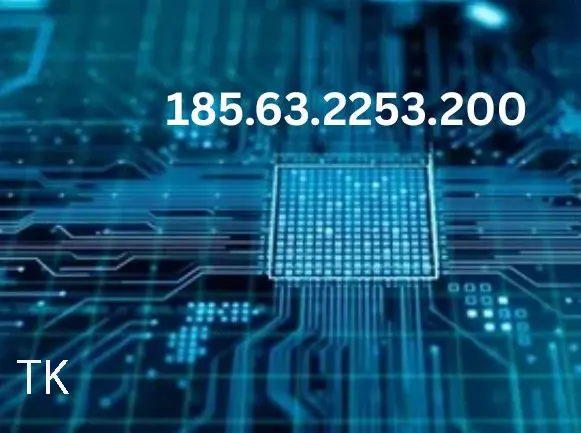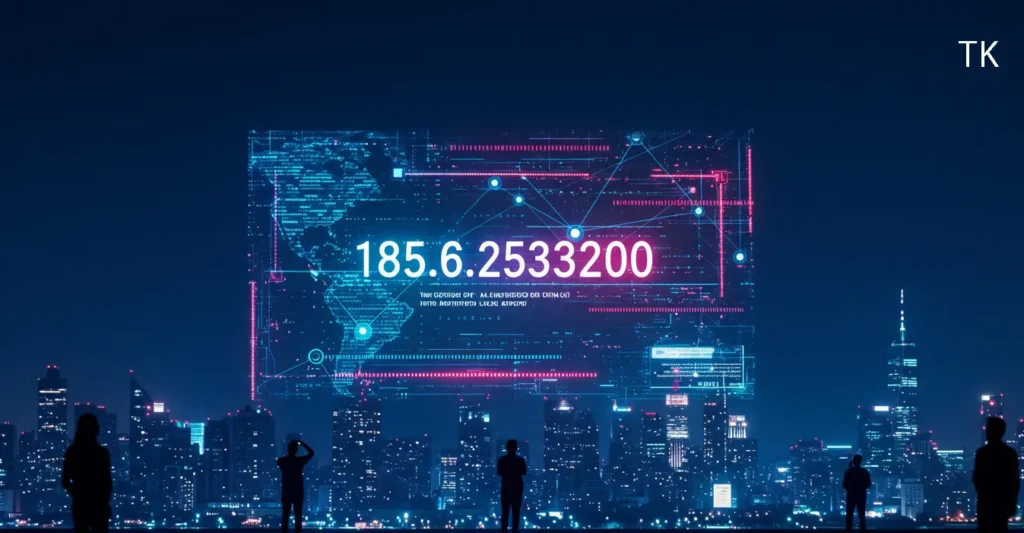185.63.2253.200 at first glance resembles an IPv4 address that is commonly used in computer networking to track devices that are connected to an internet, network, and interweb. Although, upon closer exploration, it becomes clear that this value does not conform to standard IPv4 format, which raises questions about its effectiveness and intended use.

What is 185.63.2253.200?
The IP address 185.63.2253.200 seems to be an invalid or wrong entry when assessed against standard IP address formats. In the most usual IPv4 (Internet Protocol version 4) systems, an IP address consists of four numerical segments that are known as octets and are separated by periods, like 192.168.1.1. Each of these octets of the IPs has a number between 0 and 225.
Moreover, each octet of the IPs describes 8 bits of data (2⁸ = 256), and the possible values that are formed are 256. Although, in 185.63.2253.200, the third octet (2253) exceeds the limit, making the whole IP address invalid under standard IP address format.
185.63.2253.200 is an invalid IP address that could appear due to different causes like improper data formatting and intentional manipulation in datasets. Moreover, the invalid IP address cannot be determined or routed on the internet, which means it does not represent the real server or computing device. These types of invalid IP addresses cause serious errors or misbehavior in software that processes network data.
Valid IP address
An IPv4 (Internet Protocol version 4) address is a numerical label that is used to identify or to distinguish devices on a network. The valid IP address follows a 32-bit format; moreover, it is represented as four decimal numbers called octets., Each octet is separated by periods (.).
Each of the four segments:
Must be a number between 0 and 225.
Represents an 8-bit system, which consists of a total of 32 bits (4 x 8 = 32).
Cannot contain the special numbers or letters outside the range of 0-225.
Why is 185.63.2253.200 an invalid IP address?
185.63.2253.200 is an IP address that is considered invalid because it broke the rules of the IPv4 addressing format.
Invalid IP address
The first octet is valid because the number is between 0 and 225.
The second is also valid because the number is between 0 and 225.
But the third octet is invalid because the number exceeds the given range.
The last octet is also valid because the numbers are between 0 and 225.
Third Octet (2253)
The third octet is invalid because it exceeds the range of numbers between 0 and 225; on the other hand, the allowed range of values for the 8-bit binary number system is between 0 and 225. Moreover, it requires more than 8 bits to represent, which is a violation of the standard IPv4 structure.
IP address 185.63.2253.200 is considered invalid because it violates the basic and important format of IPv4 address format, which also makes it invalid for use in networking.
185 – Valid (within 0-225)
63 – Valid (within 0-225)
2253 – Invalid (not within 0-225)
200 – Valid (within 0-225)
Why 185.63.2253.200 Matters
Understanding why an invalid IP address like 185.63.2253.200 is troublesome or problematic is important for data integrity, system functionality, and network security, because a minor error in IP address can lead to a serious or wide range of issues like operational, technical, and security.
Network Communication Failure
IP addresses are the essential part of network communication. Every computing device, server, and website uses an IP address to send and receive data or information. In case the IP address is invalid, it cannot be routed across internet networks. Moreover, after detecting a malformed address, routers and switches will drop the packet immediately. In addition, the network connectivity is broken; the request will not reach its real destination.
System Error
Most of the applications a system relies on need valid IP addresses. Those software programs that analyze IPs, like network monitors and analytics tools, may crash or track errors due to invalid IP addresses. Moreover, validation tools may treat entire standard datasets as corrupt if just one IP address is invalid. APIs and web services also reject applications that contain invalid IP addresses. In addition, this is very important for databases, cloud platforms, web apps, and IoT, where IPs are used for geolocation, to access controls, and tracking systems.
Security Risks
Invalid IP addresses like 185.63.2253.200 are also used intentionally for malicious reasons, like attackers may use malformed IP addresses to confuse log analysis tools or to bypass filters. Moreover, invalid IPs can disturb automated threat detection systems that expect standard IP formats.

Data Integrity Risks
In databases or log files, invalid IPs lead to corrupted or unserviceable datasets, especially when IPs are used for searching, recording, indexing, and analytics. Moreover, it causes misleading data in user activity tracking and server logs.
Debugging Complications
When invalid IPs are present in configuration or logs, the IT team wastes time diagnosing errors that originate from malformed IPs. Moreover, when IPs are invalid, it becomes difficult to track attackers, track packets, and identify users.
Common Causes of Invalid IP Addresses( 185.63.2253.200)
Invalid IP addresses like 185.63.2253.200 are often exposed in logs, software systems, configuration files, and databases. These malformed IPs can disturb functionality, raise security concerns, and confuse systems. The common causes of invalid IP addresses are given below:
Human Errors
One of the most common causes is simply the mistake made during manual entry. Like type 2253 instead of 253, it is invalid due to the extra digit. Incorrectly merging the digits and copy-pasting parts of the other address is another common mistake. During the conversion of IP addresses from IPv6 to IPv4, use dots instead of colons.
Example
You meant to type
185.63.253.200
But accidentally typed
185.63.2253.200
Improper Data Formatting
Data that are transferred or stored between systems frequently need to be converted or analyzed. By chance, if this case is done incorrectly, the malformed IP addresses are formed, which cause software to concatenate strings incorrectly. Moreover, from multiple fields, logs merge many values.
Malformed Input Data
Data falsification can occur during file transfer, database corruption, and fault logging systems. All this results in malformed IP addresses.
Faulty Codes or Security Defects
Incorrect IP handling in software can form invalid addresses due to defects in validation routines, incorrect assumptions about inputs, and also the use of string manipulation without checks.
Conclusion
185.63.2253.200 is not a valid IP address because it breaks the rules of standard IPv4 addressing format. Especially, the third octet exceeds the maximum value of 255, which is the standard range of IP formats. Moreover, IPv4 addresses are formed by four decimal numbers ranging from 0 to 225, and any deflection from this format may cause serious errors. At the end, 185.63.2253.200 is structurally wrong and invalid and should either be corrected or discarded based on context.

FAQs
What is 185.63.2253.200?
185.63.2253.200 seems to be an invalid or wrong IP address when evaluated against standard IP address formats. Moreover, its value does not match the standard IPv4 format, which raises questions about its effectiveness and intended use. It is invalid because it exceeds the given range.
Write the use of 185.63.2253.200.
In some cases the data become distorted during file storage, database operations, and network transitions.
Why is 185.63.2253.200 invalid?
It is invalid because in it the third octet violates the rules of the standard IPv4 addressing format. In the third octet, the number exceeds the standard range.
